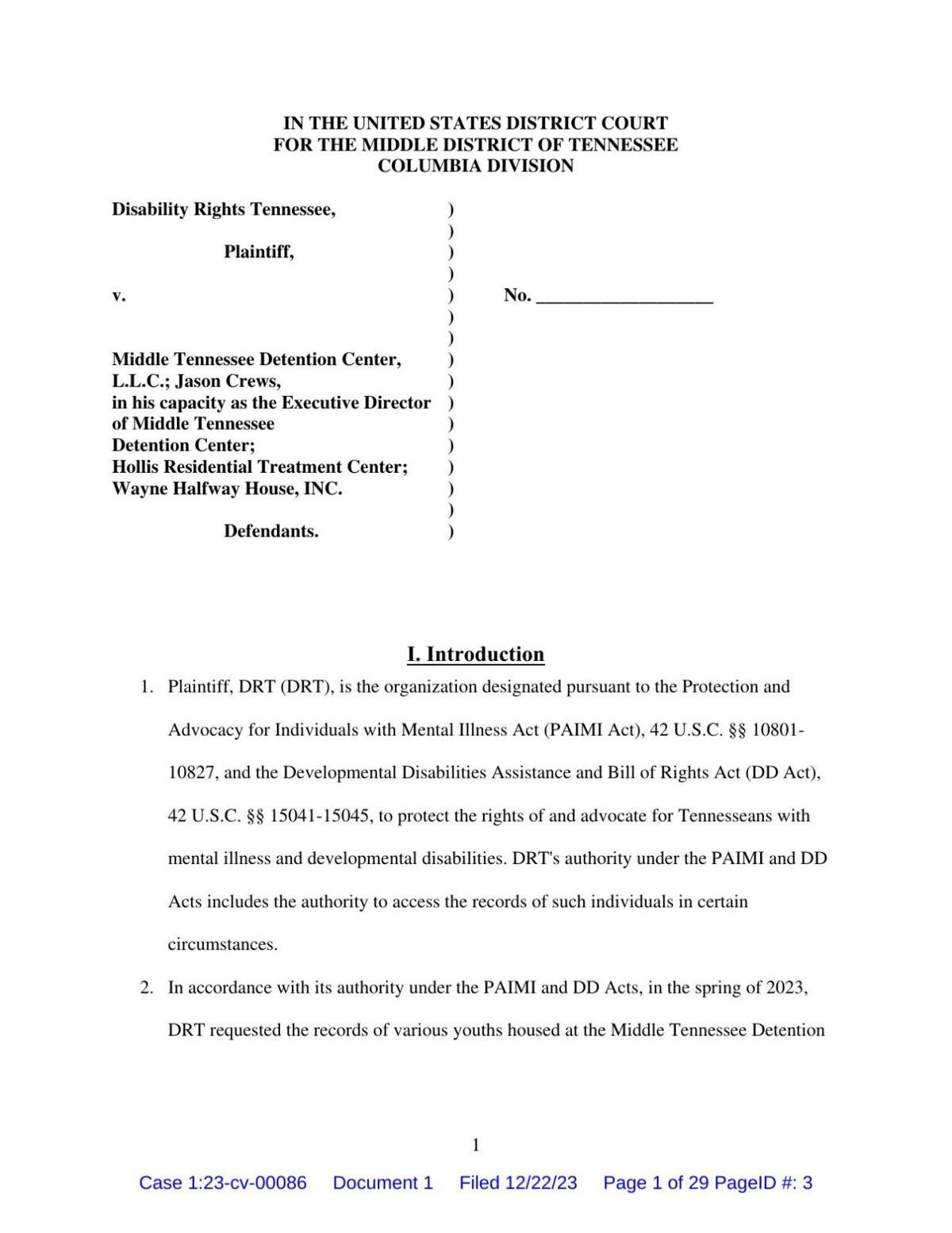Advocacy group Disability Rights Tennessee has filed a federal lawsuit against three Middle Tennessee youth detention centers, seeking records related to the treatment of children at the facilities, including the use of pepper spray.
The complaint names Columbia’s Middle Tennessee Juvenile Detention Center and Waynesboro’s Wayne Halfway House and Hollis Residential Treatment Center. Jason Crews, who serves as the executive director for both MTJDC and Wayne Halfway House, was also named in the suit. Wayne Halfway House owns and operates Hollis Residential Treatment Center and operates MTJDC. A representative for the defendants declined to comment.
MTJDC is a privately owned, state-funded facility that takes in minors by court order or referral from the Department of Children’s Services or a county court system. Wayne Halfway House and Hollis Residential Treatment Center aim to “provide quality residential treatment” for juvenile residents so that they may “permanently exit the state custody system and go on to lead successful, independent adult lives.” In recent years, MTJDC has faced scrutiny for its solitary confinement conditions.
Disability Rights Tennessee, founded in 1978, is a nonprofit that provides legal advocacy services to Tennesseans with disabilities. The group declined to comment.
The federal complaint alleges that the three connected defendant organizations have abused and neglected numerous minors, in part by using pepper spray against children, some of whom have developmental disabilities and mental health disorders.
The suit also alleges that the organizations failed to provide records and documentation of the treatment of the children, in what DRT says are violations of the 1986 Protection and Advocacy for Individuals with Mental Illness Act (PAIMI Act) and the 2000 Developmental Disabilities Assistance and Bill of Rights Act (DD Act), as well as violating the protection and advocacy systems designated by the state to protect the rights of Tennesseans with disabilities.
The complaint details the alleged treatment of six children in 2022 and 2023 who reported to DRT investigators that they were pepper-sprayed by staff members at the youth facilities, while others were not given their prescribed medications.
One male child reported having been kept in a room for 168 days in addition to being pepper-sprayed as punishment for “flooding his cell.”
Another male child was allegedly pepper-sprayed for “breaking a television in his room,” while another male child reported being pepper-sprayed in multiple incidents — “once after a fight, once for pounding on his door and yelling for his inhaler, and another time after his pipes broke and was accused of flooding his cell.”
Another child, a girl at the female-only Hollis Residential Treatment Center, was allegedly pepper-sprayed by staff “for talking loudly across the pod.”
The girl reported that “after being restrained she took her clothes off as they were burning from the chemicals and that she was restrained again while naked.”
DRT investigators requested records on the children mentioned in the complaint, including video footage of the times pepper spray was used. They say the youth centers repeatedly failed to release records in a timely manner, sometimes releasing partial records and other times ignoring the requests completely.
DRT was able to view video footage of some of the pepper-spraying incidents, but they were not permitted to make copies of the footage.
“Similarly situated youths may be in serious and immediate jeopardy,” DRT says in the complaint, which is seeking the complete records on the children, as well as a declaratory judgment that the youth centers violated the PAIMI and Protection and Advocacy for Persons with Developmental Disability acts.
Update, 5 p.m. Dec. 29: Jason Crews sent along the following statement on Friday afternoon:
“Our organization is committed to working with interested agencies so long as such participation is within the bounds of the law and protects the confidentiality and privacy of the children in our care and their families. We are dismayed that Disability Rights Tennessee filed this lawsuit on the basis that we failed to provide them with information they sought, as this suit was filed just two days after our latest correspondence with them on their subject interest.
“Within our facilities, our staff sometimes utilize oleoresin capsicum (OC), also known as pepper spray, as a method to halt violent incidences occurring by individuals who pose a harmful danger to themselves, other youth in our care or to our staff. The spray is a natural substance that is an important tool to de-escalate violent circumstances. It is used sparingly, only when other de-escalation responses to violence, usually involving physically large aggressors, are not successful. Its affects are temporary, lasting from 15 to 45 minutes and can be remedied with a mild soap rinse.
“In the 15 years that our organization has operated youth residential facilities, no injuries have occurred from the use of OC spray. Spray is utilized to stop violent activity that would otherwise lead to severe physical injury. We are committed to operational transparency and have ongoing reporting to the Tennessee Department of Children’s Services and communication with Disability Rights Tennessee and other organizations that have an interest in our facilities.
“Additionally, we are proud of our service to the kids in our care and to our state and community stakeholders. Together, we provide young people, who have made mistakes, with educational and career training opportunities that help them lead better lives when they leave our care.”







